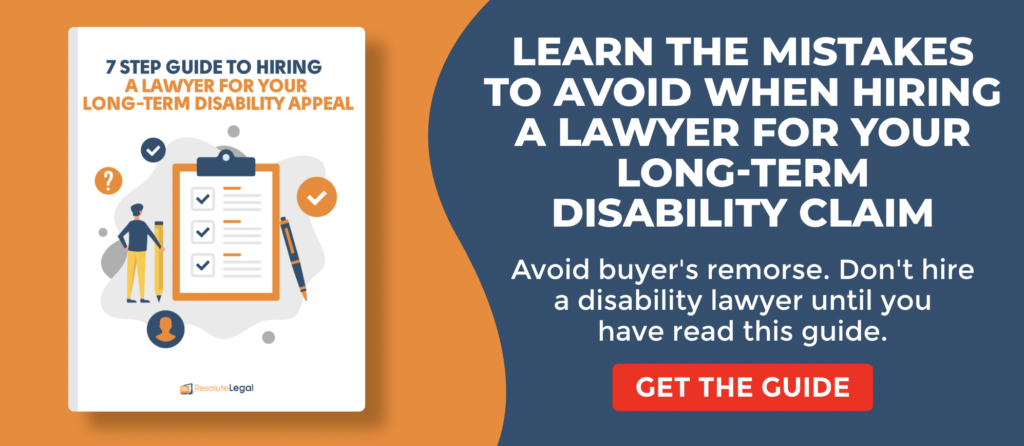People often ask us: Do I need a lawyer for my short-term disability claim, or can I handle it myself?
Generally, the answer is that you can probably handle things on your own! But it really depends on your situation. Keep reading to find out what we recommend.
This article is part of our Ultimate Guide to Short-term Disability Benefits.
When do I need a lawyer for short term disability?
As stated earlier, you don’t necessarily need a lawyer to help with your short-term disability claim. However, here are a few scenarios where you should definitely consider talking to someone with experience — whether that be a lawyer, legal consultant or a member of a law firm’s support team.
If you’re starting your short-term disability application, transitioning from work to sick leave
Having the support of a lawyer in the initial application stage can maximize your chances of success. They can help you craft an application that tells the best story and highlights the things insurance companies are looking for. However, contrary to what you may have read elsewhere, we don’t necessarily think everyone needs to pull the trigger and hire a lawyer right away.
We have plenty of resources available to help you in these early stages of your claim. Take the time to educate yourself and maximize your chances of success!
Many firms, ours included, also offer free consultation/case evaluation services that can be the first push in the right direction. These free consultations/ evaluations can reveal a lot. During a free consultation/evaluation, a lawyer can review your case. You might send in documents or just tell them what’s going on. Either way, they can help you understand if you need legal support or not. They can also suggest the resources that will help you the most at this moment.
To schedule a free case evaluation, call us toll-free at (888) 732-0470.
If your short-term disability claim has been denied
If your claim has been denied, we highly recommend contacting a lawyer. Without seeking advice before trying to appeal on your own, you might just make the same mistakes that lead to the denial in the first place.
The key thing that a lawyer can help with is identifying the real reasons for your denial. They can also see any red flags on your case from the insurance company’s point of view. Knowing these will help you put your appeal together because you will know exactly what you have to dispute.
We know that people get anxious about their health or finances and any other number of stressors during the appeal process. The good news is, you can often contact a lawyer about this for free. Most law firms offer free services and resources to help you do it all on your own.
Related reading: Why was my short-term disability claim get denied?
If you’re being sent back to work
Perhaps you are still receiving short-term disability payments, but the insurance company says they will stop soon. At this point, you may need more in-depth advice. At this stage, a lawyer can examine the communications from your insurance company to see what’s happening, and what steps you need to take.
Again, this can sometimes be done for free. Once the free consultation or claim review is completed, you can take the next steps on your own or hire a law firm to help guide you the rest of the way through.
Should I Hire a Short Term Disability Attorney?
Not everyone needs a lawyer to assist them with their claim. However, they can be an invaluable asset if you are dealing with a denial or any other tricky circumstances. In this section, I’ll identify four ways a lawyer can help with your short-term disability claim.
1. Identifying problems with your claim
Typically, the lawyer will begin by getting a full copy of your claim file. This file is a goldmine of information and will shed light on your whole case. It includes everything the insurance company is working with — internal communications, documentation of any problems they have with you, and independent doctors they hired to review things you didn’t even know about!
The lawyer will take that information and identify any red flags from the insurance company’s perspective. Once the problems are identified, they can plan a strategy to eliminate the red flags and chance the insurance company’s mind.
2. Ordering documents
Lawyers can also order records from other sources more efficiently than you might be able to alone. Whether it’s from your regular doctor, hospitals, or treatment providers, the lawyer can get these documents with ease. This is because the lawyer can ask specific questions and give more direction as to what information they need. Remember, they have seen the entire claim file, so they can confidently request exactly what they will need to get your claim approved.
3. Communication
Another area that a lawyer can help with is communicating with the insurance company. If you’re on an approved claim, you still might have to talk to them directly. But if you’ve been denied, your lawyer can handle all of the stressful communication that you would have to deal with otherwise. They can also speak with your employer on your behalf to some extent.
4. Guidance through appeals
Finally, your lawyer will be able to guide you through the appeals process. There is a relatively standard process for internal appeals that a good short-term disability lawyer will be very familiar with. The final appeal can be different depending on the insurance company. Your case might go through the court system or to an arbitrator or hearing. Either way, your lawyer will stick with you through to the end. Of course, if you’re in a union, you may have to go through them instead of hiring a lawyer. But your lawyer can help explain the process to you.
Next Steps — Download our Free Guide!

